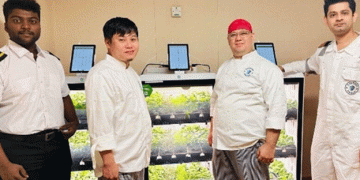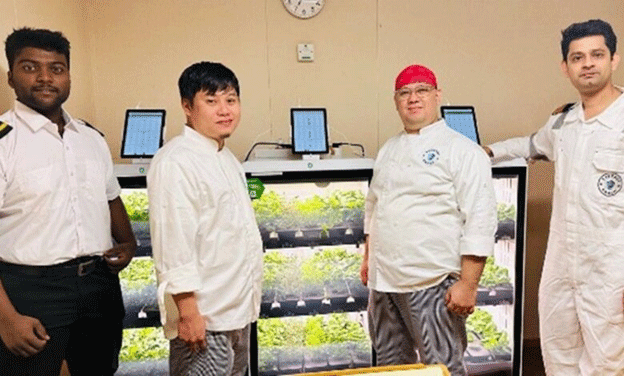In a groundbreaking move toward sustainability and crew welfare, Synergy Marine Group has become one of the first maritime companies to adopt autonomous vegetable-growing technology on ships. This initiative, in collaboration with shipowners such as Eastern Pacific Shipping, Seaspan, Capital Shipping, and CoolCo, integrates Agwa’s AI-powered cultivation units aboard the Suezmax tanker Effie Maersk. These units, which resemble standard refrigerators or wine coolers, are designed to grow fresh vegetables and herbs autonomously while regulating key environmental factors such as light, temperature, and water.
The Agwa units, which use artificial intelligence (AI), cameras, and sensors, monitor and adjust environmental conditions to optimize plant growth, ensuring that the system is fully automated. The crew on board the Effie Maersk only needs to monitor the process periodically and check on the plants’ progress. Since the system’s implementation in September, the tanker has been harvesting up to four bowls of fresh salad and a variety of herbs each week, which contribute to the crew’s healthy, plant-forward eating habits.
Rajesh Unni, founder and chairman of Synergy Marine Group, shared that the project was born out of a growing trend among seafarers toward healthier, more plant-based diets. “Among today’s increasingly health-conscious mariners, we’re observing a noticeable shift toward healthier, plant-forward eating habits,” said Unni. This initiative also addresses a crucial need for fresh, nutritious food, which plays a key role in maintaining the crew’s morale and overall well-being during long voyages.
The success of this project aboard the Effie Maersk is expected to pave the way for similar initiatives across Synergy’s managed fleet of over 700 ships. This fleet-wide expansion aims to provide crew members with easy access to fresh food, which is often limited on long voyages due to storage constraints.
Additionally, the integration of autonomous farming technologies at sea aligns with global trends toward sustainable food production. Maritime operations, traditionally reliant on external supplies for long periods, can benefit significantly from in-situ cultivation. AI-directed systems not only improve the freshness of the food but also reduce the need for wasteful food packaging and long-distance transportation, which have high carbon footprints.
The project also highlights the growing intersection of technology and agriculture. AI and automation are transforming various sectors, and the adoption of these technologies in a maritime setting is a unique example of how innovation can enhance sustainability and improve quality of life at sea. Similar AI-driven agricultural technologies are already being used in other sectors, with vertical farming and hydroponic systems gaining popularity in urban settings for their space-saving and resource-efficient nature.
Synergy Marine Group’s adoption of autonomous vegetable growing technology marks a significant leap in sustainable practices for the maritime industry. By providing fresh, nutritious food to crews, this initiative not only enhances their health and well-being but also reduces environmental impact by promoting local food production. As more ships adopt this technology, the broader maritime industry may see a shift toward more self-sustaining, eco-friendly operations, offering a model for sustainable living both at sea and on land.































